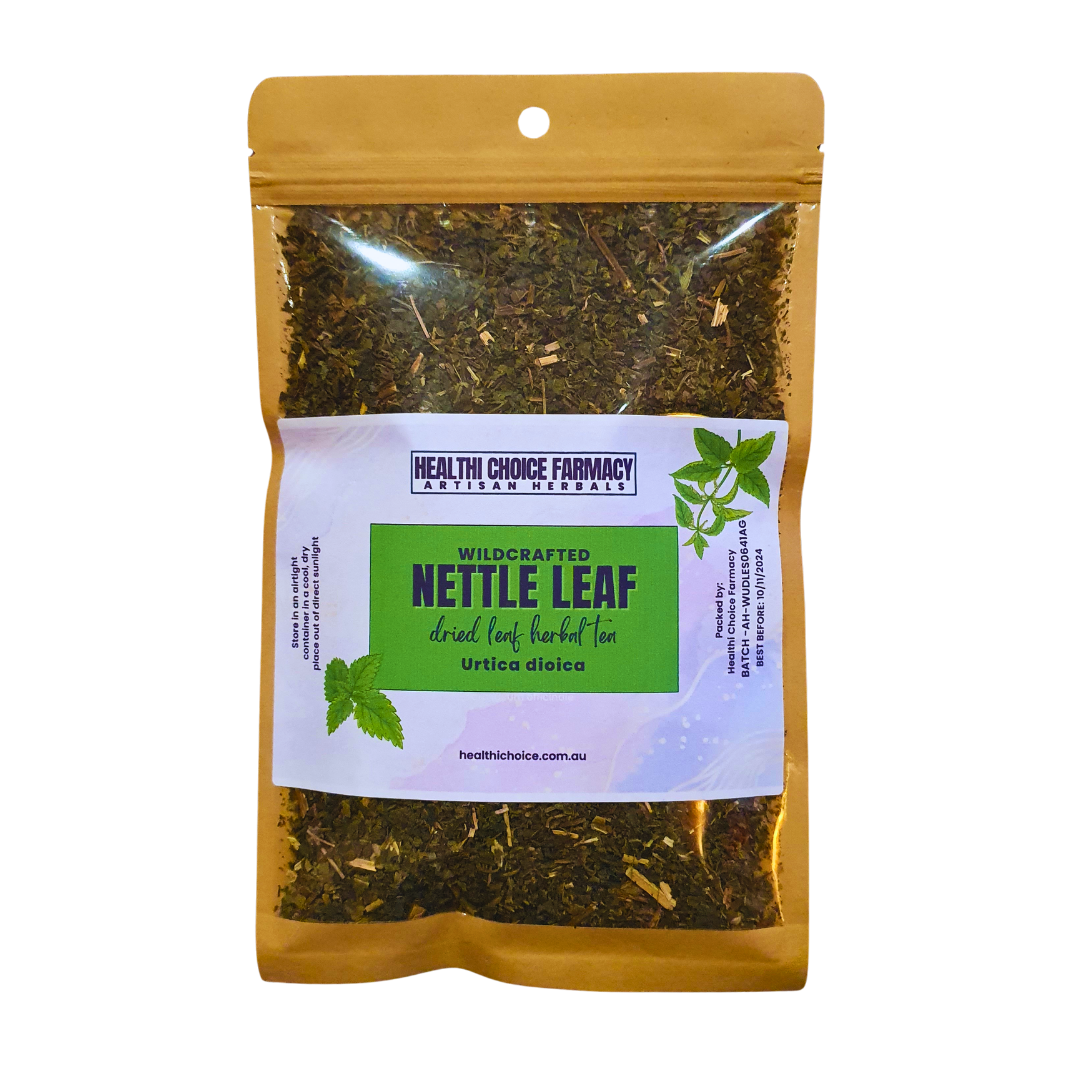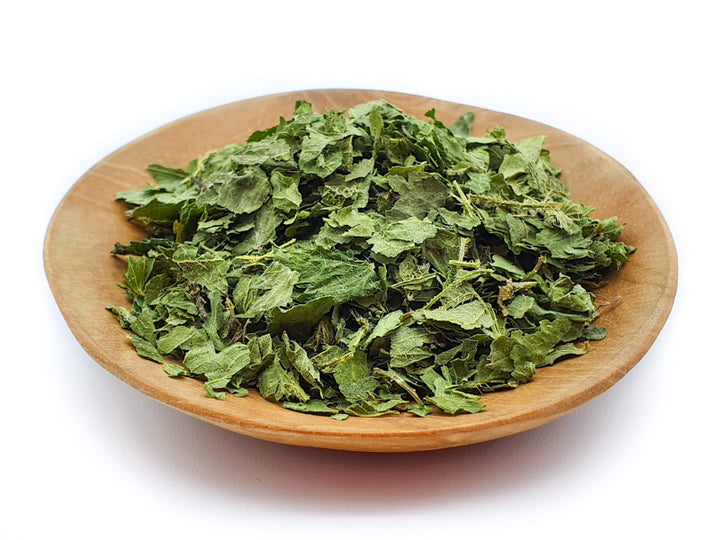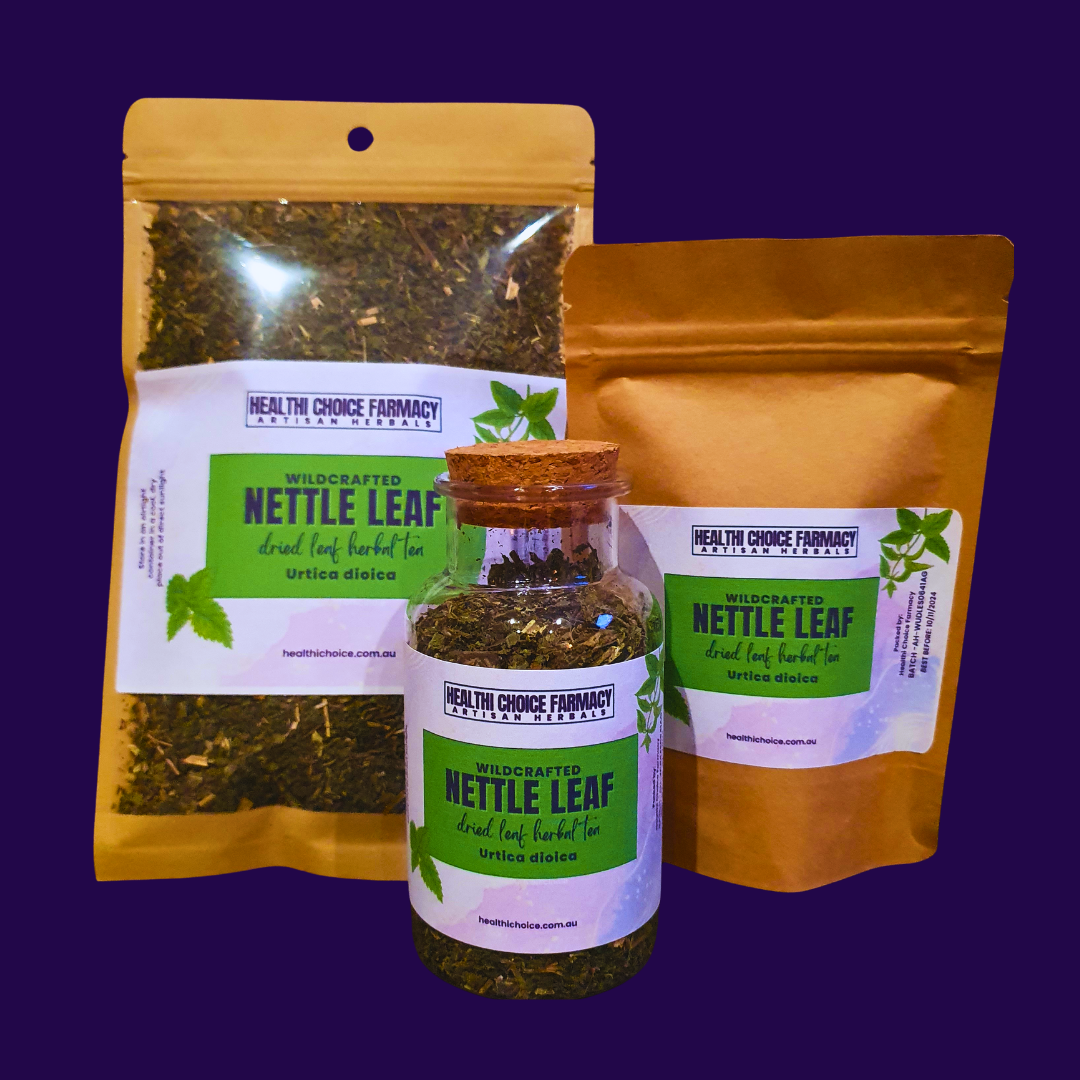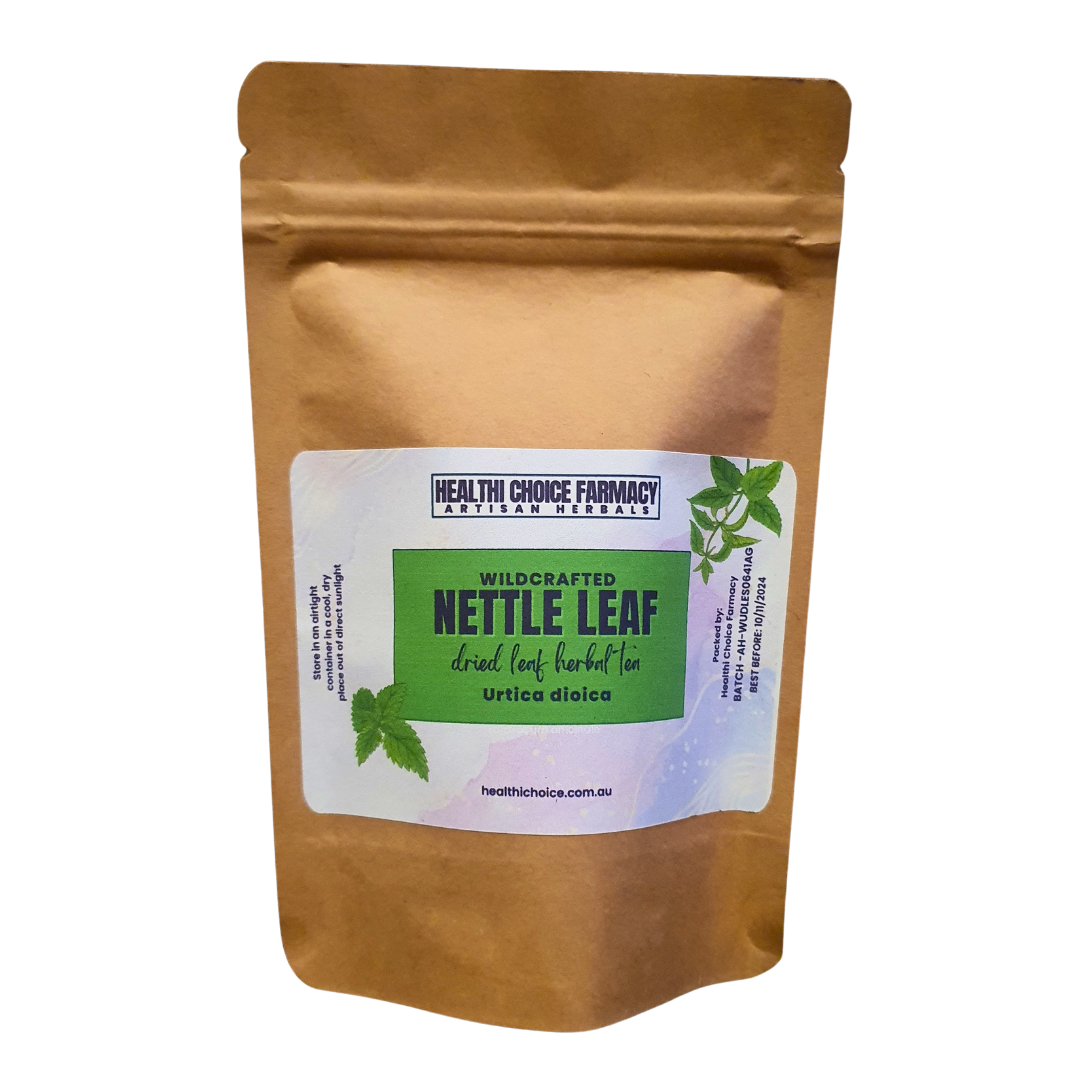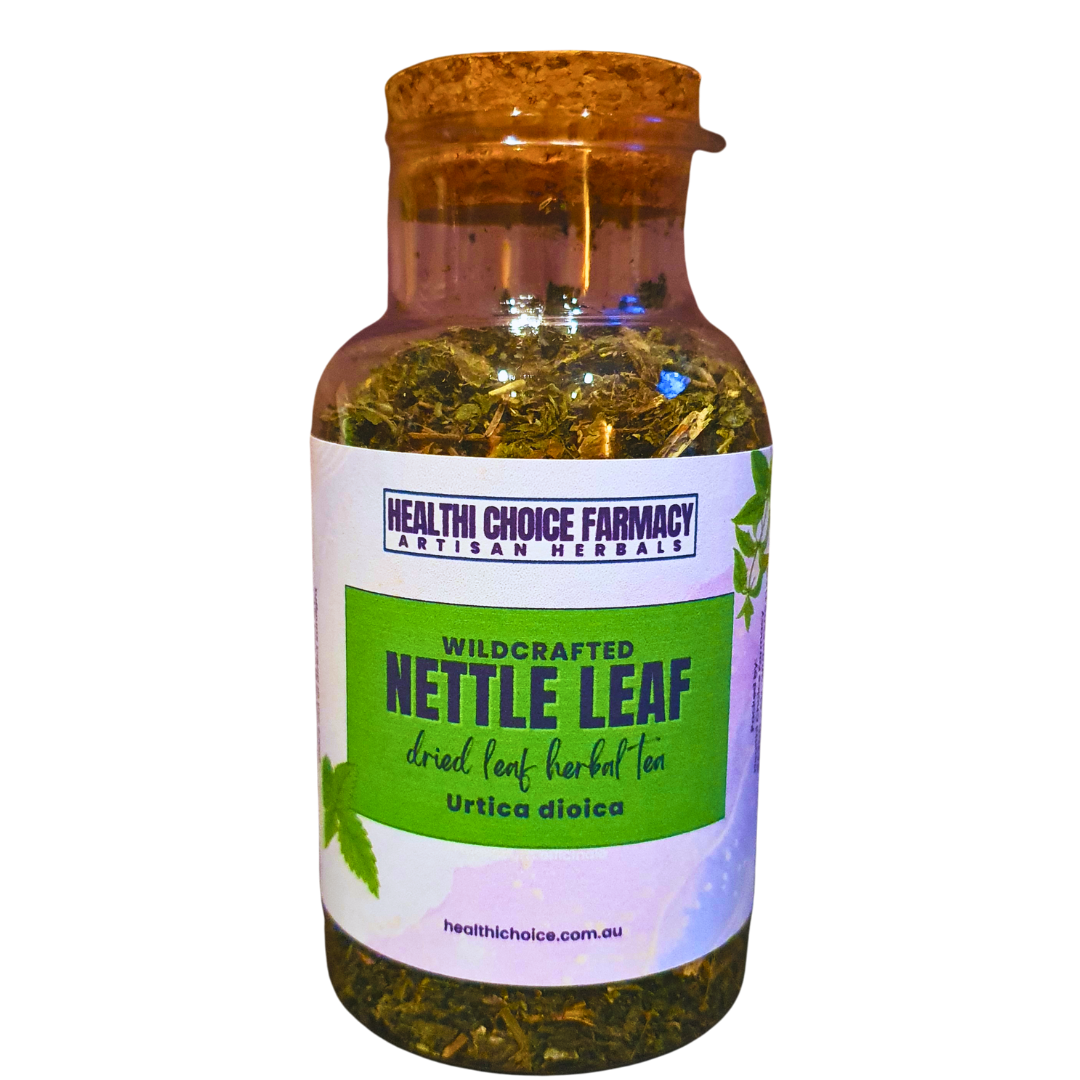Healthi Choice
Couldn't load pickup availability
Description:
Common name: Stinging Nettle
Botanical Name: Urtica dioica
Stinging nettle (Urtica dioica) has been a staple in herbal medicine since ancient times. Ancient Egyptians used stinging nettle to treat arthritis and lower back pain, while Roman troops rubbed it on themselves to help stay warm.
Its scientific name, Urtica dioica, comes from the Latin word uro, which means “to burn,” because its fresh leaves can cause a temporary burning sensation upon contact. The leaves have hair-like structures that sting and also produce itching, redness and swelling. However, once it is processed into a tea or supplement, dried, freeze-dried or cooked, stinging nettle can be safely consumed.
Nettle can be drunk as a herbal tea infusion or added to soup, vegetable dishes, meat and egg dishes.
Stinging nettle’s leaves and root provide a wide variety of nutrients, quoted in the Journal of Herbal medicine to be an Extraordinary vegetable medicine
- Vitamins: Vitamins A, C and K, as well as several B vitamins
- Minerals: Calcium, iron, magnesium, phosphorus, potassium and sodium
- Fats: Linoleic acid, linolenic acid, palmitic acid, stearic acid and oleic acid
- Amino acids: All of the essential amino acids
- Polyphenols: Kaempferol, quercetin, caffeic acid, coumarins and other flavonoids
- Pigments: Beta-carotene, lutein, luteoxanthin and other carotenoids
Nettle has an array of amazing medicinal properties.
It’s a circulatory stimulant, blood tonic, antiseptic, astringent, an antidepressant and a diuretic. Common medicinal uses include: stimulates lactation, increases energy, improves aches in joints from arthritis, gout and rheumatism, eases symptoms of PMS, contains anti-histamines to treat asthma, allergies, and hay fever.
- Nettle as a cleansing detoxifying herb, it increases urine production and the elimination of waste products. It is useful for skin problems and arthritic when poor kidney function and fluid retention are the cause.
- Stinging nettle harbors a variety of compounds that may reduce inflammation. In animal and test-tube studies, stinging nettle reduced levels of multiple inflammatory markers by interfering with their production. In human studies, applying a stinging nettle cream or consuming stinging nettle products appears to relieve inflammatory conditions, such as arthritis.
- Medical studies suggest Stinging Nettle may help reduce prostate size and treat symptoms of an enlarged prostate gland in men with benign prostatic hyperplasia (BPH). https://pubmed.ncbi.nlm.nih.gov/16635963/
- Stinging nettle is viewed as a promising natural treatment for allergic rhinitis and hay fever. Test-tube research shows that stinging nettle extracts can inhibit inflammation that can trigger seasonal allergies. This includes blocking histamine receptors and stopping immune cells from releasing chemicals that trigger allergy symptoms. https://pubmed.ncbi.nlm.nih.gov/19140159/
- Urtica dioica has traditionally been used in the management of cardiovascular disorders especially hypertension. Animal and test-tube studies illustrate that it may help lower blood pressure in several ways. For one, it may stimulate nitric oxide production, which acts as a vasodilator. Vasodilators relax the muscles of your blood vessels, helping them widen. In addition, stinging nettle has compounds that may act as calcium channel blockers, which relax your heart by reducing the force of contractions https://pubmed.ncbi.nlm.nih.gov/27585814/
- May Aid Blood Sugar Control. Both human and animal studies link stinging nettle to lower blood sugar levels. https://pubmed.ncbi.nlm.nih.gov/23115450/ In fact, this plant contains compounds that may mimic the effects of insulin. https://pubmed.ncbi.nlm.nih.gov/20013820/
- Reduced bleeding - Medicines containing stinging nettle extract have been found to reduce excessive bleeding, especially after surgery. It has been shown to slow bleeding from wounds and nosebleeds and also heavy menstruation. It is also useful for anaemia
- Liver health: Nettle’s antioxidant properties may protect your liver against damage by toxins, heavy metals and inflammation. https://pubmed.ncbi.nlm.nih.gov/22585933/
- Wound and burn healing: Applying stinging nettle creams may support wound healing, including burn wounds
- Bath soak - Can be added to your Bath soak to benefit from wound healing, anti-inflammatory, mast cell stabilising and detoxification
Part Used
Aerial Parts
Actions
Nutritive tonic, diuretic, anti-haemorrhagic, hypoglycaemic, circulatory stimulant, galactagogue, alterative.
CONTRIDICTIONS ‼️
Pregnant women should avoid consuming stinging nettle because it may trigger uterine contractions, which can raise the risk of a miscarriage
Speak to your doctor before consuming stinging nettle if you’re taking one of the following:
Blood thinners
Blood pressure medication
Diuretics (water pills)
Diabetes medication
Lithium
Stinging nettle could interact with these medications. For instance, the plant’s potential diuretic effect may strengthen the impact of diuretics, which can raise your risk of dehydration.
All information provided on this website is for informational purposes only. Please seek professional advice before commencing any treatment.
